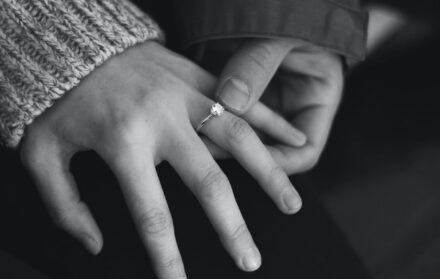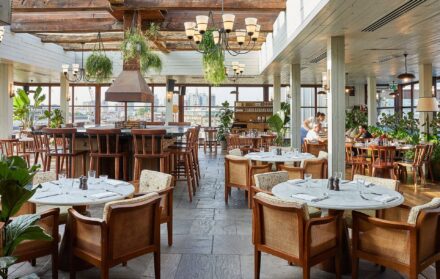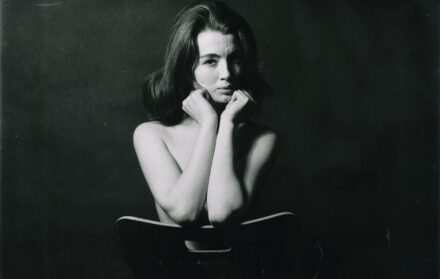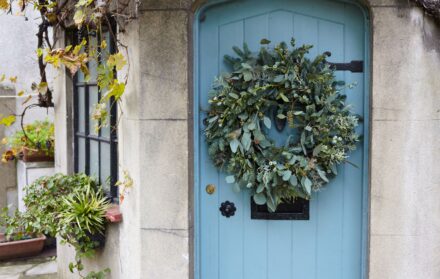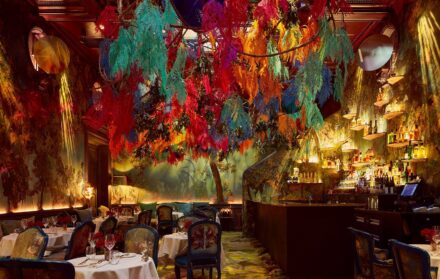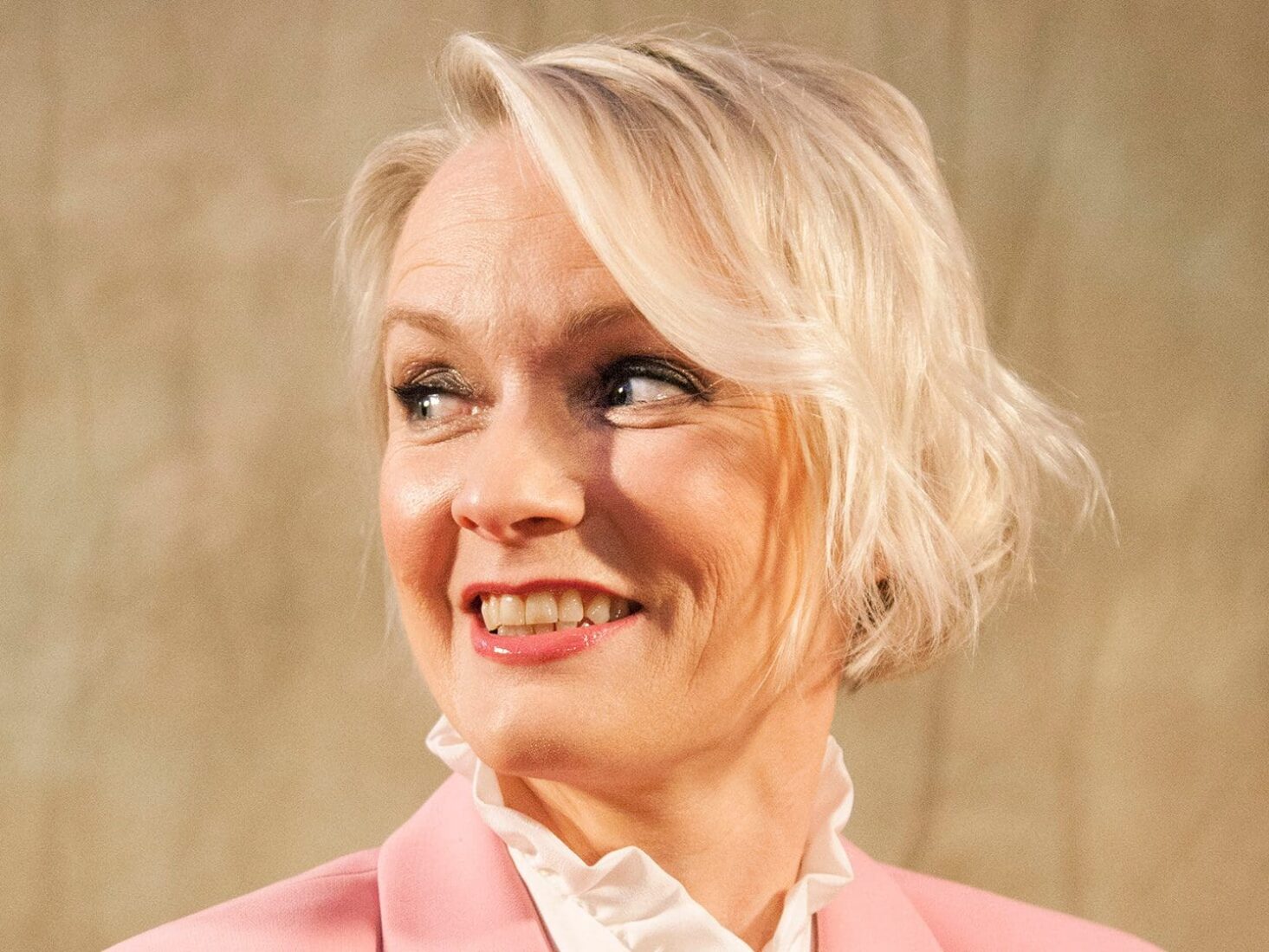
Women in Luxury: Lorraine Candy, journalist and podcaster
After decades working at some of the UK’s most prestigious magazines, Lorraine Candy gave it all up to host a podcast celebrating and examining midlife women. She explains why…
Giving up a career as a high-powered glossy magazine editor in order to run a podcast might sound like a stereotypical 21st-century mid-life crisis. And, in some ways, that’s exactly what happened to Lorraine Candy.
“We started the podcast because we kept saying to each other, ‘Why are we unravelling?’ Why do we feel so awful?’,” she says, referring to her co-host Trish Halpin. “I thought I had a brain tumour or early-onset dementia until I was prescribed hormone replacement therapy.”
After decades working at some of the top titles in British publishing, including stints as editor-in-chief of Elle, Cosmopolitan and The Sunday Times Style, Candy put her journalistic skills to work, researching and interviewing experts until it became clear who the real culprit was: the menopause.
“We just didn’t know it was coming and it can derail you,” she explains. “There are over 40 symptoms of perimenopause [the 10 years before menopause] and some of them are anxiety and depression. Having been incredibly organised and efficient and running a home and having four children, I just suddenly wasn’t there anymore, and there was a physiological reason for that.”
Determined not to let anyone else be taken by surprise, Candy and Halpin started Postcards from Midlife, a refreshing, funny and honest look at the trials and tribulations of life for middle-aged women. And it struck quite the chord.
“We had to set up a limited company and talk to lawyers,” says a bemused Candy. “The show grew so quickly that it was quite a surprise to us. We just thought we’d quietly do this on a Thursday together but then we had to get agents and producers because it’s just too big for us to do on our own.”
Add to this an 11,000-strong private Facebook group with members clamouring to meet Candy and Halpin in person and the result is Postcards from Midlife Live – an event that began as a live podcast recording but quickly grew to a two-day festival featuring workshops, masterclasses and speakers including Andi Oliver, Professor Tim Spector, Ruby Wax and Sadie Frost.
So, how has a career of fashion weeks and celebrity interviews led to Candy’s current success? Here she talks about the importance of focus, being kind to yourself and never thinking you know it all.
I wanted to be a journalist or a magazine editor. I used to make scrapbooks of magazines and I did a lot of reading. It’s quite unusual, but I was very, very focused, which is why I got a job at 16 on a local paper. I just thought, ‘I love reading, I love writing, I love journalism, I love watching the news and I want to travel and meet people and interview them’, so I was quite focused about it.
In terms of a path, it was slightly different because I wanted to be a journalist but I also really wanted to edit a glossy magazine. Journalism is the interesting bit for me, not the fashion or the beauty bit, so I knew I’d have to train at that first and I wasn’t always sure I would end up on a glossy because I started in newspapers. Eventually, I worked on Marie Claire and then I went to Cosmo, but in between that, I was features editor of The Times and deputy editor of The Times’ Saturday magazine. I’ve always had one foot in either being a newspaper journalist or working on a glossy.
“I always thought if I was to get a tattoo on my wrist it would say ‘think again’.”
Lorraine Candy
I didn’t have qualifications and I hadn’t gone to university. I’ve been doing this 30-odd years and, in those days, you couldn’t apply for jobs at the BBC if you didn’t have a degree, they wouldn’t take your CV. I couldn’t do anything, journalism-wise, where they required a degree so that was a little bit of a hindrance. But it didn’t stop me, I worked on the broadsheets for a long time.
I think the hindrance really was that I didn’t know anyone in the industry. I couldn’t ring anybody and say, ‘Is it possible for me to do work experience?’ I was completely unknown and unqualified, but when you’re young and you don’t know what you don’t know, you just push on through and motivate yourself. That’s actually quite helpful in life.
I was also very lucky to be in the right place at the right time. I applied from the Cornish Times to go and work on every paper in Britain and I got a yes from the Wimbledon News. By sheer luck, it was a real breeding ground for big journalists – Piers Morgan and I started together – it just happened to be a really good local newspaper that was feeding journalists to international newspapers. If I’d ended up on a paper in a different part of London or on a weekly paper in Coventry or something, I might not have had the breaks. It was a melting pot of really brilliant journalists all in the same place and there was a lot I could absorb from that.
My last role was the Sunday Times Style. Before that, I was at Elle for 12 years, Cosmo for four years, and I was on the team at the Saturday Times Magazine when it was launched as a glossy, so I guess I felt I really had done it. [Trish Halpin and I] had a podcast, which we’d started the year before I left The Sunday Times, and it was beginning to do really, really well. I was also writing a book and I had a column about parenting. There was a sense that budget would have to be reduced at The Sunday Times and it seemed to me that I was probably the best way to save that budget. I wouldn’t be able to do the job as I had been previously doing it. The Sunday Times Style is still amazing but it wasn’t going to be the job I wanted to do so, for me, it made more sense to opt-out, save the money for them and do the podcast.
Now, we do more than the podcast: we consult for beauty companies and we’ve worked with the HR department of big companies around women who need support for menopause and perimenopause. We are looking after those luxury consumers that have been following us through the magazines that we edited. Trish edited Marie Claire, Red and InStyle so between us, apart from Vogue, we’ve edited every glossy magazine on the newsstand. Those readers are quite loyal to us and we’re just evolving with them.
We are aimed at women over 40 – Generation X and older millennials – and what happens at that age is that you have a huge change of identity. Your children leave home in the decade between 40 and 50 so you’re often not mothering anymore and, biologically, it’s quite rare to have children after 50. So you’re in this place where you aren’t defined by your motherhood. You’re not defined by your usefulness; society slightly undervalues you and makes you feel a little bit invisible.
Alongside that, it’s a huge period of great change. You might be looking after elderly parents or at the end of a marriage. The highest rates of divorce are between 45 and 49. The highest rate of suicide among women is between 45 and 49. This is why we set up the podcast. We thought if you know that all of these things could be in your world then you can really prepare yourself. Because the other side of it is that you are older and wiser and happier. You’re calmer, you’ve learned to say no and set boundaries. It’s a very confident and liberating stage of life. You do have to make a few adjustments and they’ve come as a surprise to this generation – I don’t think they will to millennials who are coming after us.
Our days are governed by ourselves now. We’re not structured into this rigid nine-to-five of an office anymore and I’m not going to the catwalk shows twice a year like I used to. I’m usually either writing a book or writing about a book and I do quite a lot of Instagram; I have a big community there and I get asked a lot questions. We record the podcast on a Thursday over Zoom, but we pre-interview everyone who comes on so I might be doing that. We also write a loose script so that we don’t waffle because we want to be useful and practical. Then we might be hosting dinners or going to events and I also do a bit of interviewing for other people and other podcasts. So we’re always interviewing someone, writing about someone or about to interview someone.
The best part is meeting the most interesting women. That has always been the best part of my job, actually: learning from other women. They might be younger women, they might be older women. It’s not necessarily famous women, although we’ve had Elizabeth Hurley and Juliet Stevenson and some really big names on the show. I’ve met loads of midlife women and they’re just amazing. Honestly, without fail, every woman I meet at the moment is absolutely fascinating.
The worst bits are the ones that Trish and I had a bank of assistants doing for us before. So the accounts and working out the business plan and structuring it so that we don’t say yes to everything because we still have to earn a salary and we’re trying to balance our time. I’m really hopeless with the diary. It’s like a maths formula to me. I’m just really bad at organising my time. It’s one of my worst traits.
I do a lot of open water swimming, that’s my reset, so on a Friday and Saturday I will swim early in the morning. I also do yoga three to four times a week with Nadia Narain, one of the founders of TriYoga. She’s amazing so I try never to miss her class. On weekends, we walk the dog on Hampstead Heath or in Regent’s Park. I also love films and am a complete book addict. Last year I judged the Women’s Prize for Fiction and I will always have one or two books on the go at the same time.
"The money is, and always has been, controlled by men. Without the money, we haven't had the power."
Lorraine Candy
I’ve had the most exciting career. If you’re a really nosy, curious person and you can ring up and say, ‘My name is Lorraine Candy and I’m from Elle or The Times or The Sunday Times’ and then be let into that room to meet those women then that’s kind of amazing. I’ve been sewn into a suit backstage by Dolce & Gabanna. Karl Lagerfeld gave me a surfboard for my 40th birthday and took me to dinners and lunches. I’ve interviewed Oprah Winfrey live on stage at the Barbican. I did most of the cover star interviews when I was at Elle so I would be flown to New York or LA to interview people. I’ve known Emma Watson since we did her first shoot after she left the Harry Potter franchise and I’ve seen her grow into this amazing young woman.
I’ve also been able to raise money for various charities for women. I did a lot of work at the beginning of my career around domestic abuse which, at the time, was something that just wasn’t talked of. 30 years ago I interviewed the first woman who had been sent to prison for murdering her husband after he had been abusing her horrifically for years. It was self-defence and we launched a huge campaign on the Daily Mirror to get the law changed so it recognised domestic abuse and coercive control. So I’ve been in both places: I’ve been in this really glamorous place and I’ve been in a very kind of newsy place as well.
We all have times when we think, ‘Oh my god, this is just such hard work and I haven’t been my best self or I’ve not been the best boss or I haven’t achieved the goal.’ I think with setbacks, you learn from them, don’t you? You try and think, what could I have done differently? How could I not do it again?
I guess the real setback for me was the sadness that, alongside the shrinking of budgets, there was a kind of shrinking of creativity in glossy magazines. They’re things to inspire you and they’ve got to be pieces of art really, because they’re such physical beings. As budgets shrank and that word ‘content’ seeped its way into our language, it was maybe more sad than a setback.
The money is, and always has been, controlled by men. Without the money, we haven’t had the power. Society is set up to work for men, it’s not really set up to work for women, and we perhaps would have set it up in a slightly different way. It sounds glib, but you can look at every single survey on pay, on emotional labour, on sickness and health, and women just come out worse by miles and it’s not getting better. The gaps are not being closed.
Anything to do with media, when you go right to the top, is men. There are very few women in those places. It shouldn’t be all women but it should certainly be more equal. A more equal world is a better economic proposition – most surveys on economies around the world will show you that – so it’s a bit of a shame that we’re still working in a very patriarchal system. If you look at the top 10 podcasts, almost all of them are two men talking or a man talking about World War Two. If you look at the top ten hardback books, it will be mostly male-dominated and that’s incredibly frustrating because there’s literally no reason for that apart from privilege opening the doors in a much easier way.
But I think things are changing and I’ve got really high hopes for the future of media. Women are able to control their own message and their own voice – that’s what social media has given us. There are some terrible male interviewers who write dreadful things when they interview women but now women can reply immediately and say, ‘You know, I didn’t mean that. I didn’t say that.’ I think women can control their image and the language around them more, so that’s really helpful. My teenagers have a whole different way of approaching media. If they notice the wrong language around something they call it out immediately. There are more women writing screenplays, there are more women directing films, and there are more women financing and green-lighting films. It’s getting better. It’s nowhere near yet, but it’s getting better.
I think you have to have a little bit of gullibility. I’m not talking about science or the frontline of NHS or anything like that, but, in a creative industry like mine, you have to have joy in everything. I think that’s quite contagious. I also think the moment you get confused between the title and who you are as a person then you’re on a downward spiral. If having that title totally defines you and makes you feel you’re better than everyone else, then you have missed the target by miles. Everyone says ‘Be Kind’ but, honestly, it really pays off being kind to people.
You have to actively look for people that are not the same as you and that come from a very different background. We have a tendency, and this is scientifically proven, to employ people in our own image. This is why men are in charge because they just keep interviewing white men. I have always, right from the beginning, tried to employ people who don’t look like me, don’t sound like me and don’t come from my background. I’ve tried to be really non-judgmental about where they’ve come from, even if it doesn’t make me feel safe. I think this is the next frontier for employers: the idea that everyone is incredibly different neurologically. The way some people work won’t fit in with a rigid routine of nine to five so you have to balance those people against other people in a team.
I had a lot of coaching so I knew my management style was incredibly energetic and that I’m quite forthright in my opinions. That doesn’t work for everybody so I instituted what I call reverse mentoring. I’d have a lot of young women working for me and, maybe once a month or every six weeks, I’d have a little committee of them come and I’d ask them, ‘What do you think’s wrong with the magazine and am I doing a good job?’ It’s a frightening thing to do but I also wanted to know about their lives, what they were doing and what things meant to them because you can stay in your own mind and in your own tribe, too. I think being really open to that is good. You have to have the end say because you’re the one that’s going to get fired if the magazine doesn’t make money. You can win all the awards in the world, but if you’re not making money, then you won’t last very long. But you are only ever as good as your team, so you need to nurture that.
Be kind to yourself. I’m from Generation X and a lot of us are burnt out. We were sold this idea of having it all but we weren’t kind to ourselves. We had a really strong endurance mindset and that’s not healthy at work.
Also, know your facts and be prepared. I think your mindset in an interview has to be, ‘What can I offer the employer?’ It’s really common for young women to think almost entirely about how the job would work for them, which is great – but don’t bring that into an interview. Bring into the interview, ‘This is what I could do for you’ because there are five other people coming in for the same job. Men are quite forthright. They say, ‘This is what I will do for you. This is the money I need to be paid to do this. This is what I will deliver.’ That mindset might be helpful.
I always thought that if I was to get a tattoo on my wrist it would say ‘think again’. There used to be this tradition of keeping monthly magazine covers secret and releasing them at the last minute. We had one of our ‘think again’ meetings at Elle and I said, ‘What if we release them the day we shoot them? What if we say this is coming? Wouldn’t people look forward to that more because we can communicate it in many different ways?’
We did it because we had a Zayn Malik cover, one of our first male covers. I said, ‘If we release this now the millions of people that love Zayn, even if they weren’t normally going to buy Elle, will buy this but they won’t if it just suddenly comes onto the newsstands.’ I remember my boss saying, ‘You can’t do that. It’s never been done that way. Don’t be ridiculous.’ But it was such a game-changer for us and it increased sales. Every time you do something, do it the traditional way and then look at it and think again – that’s probably a good piece of advice for young women.

